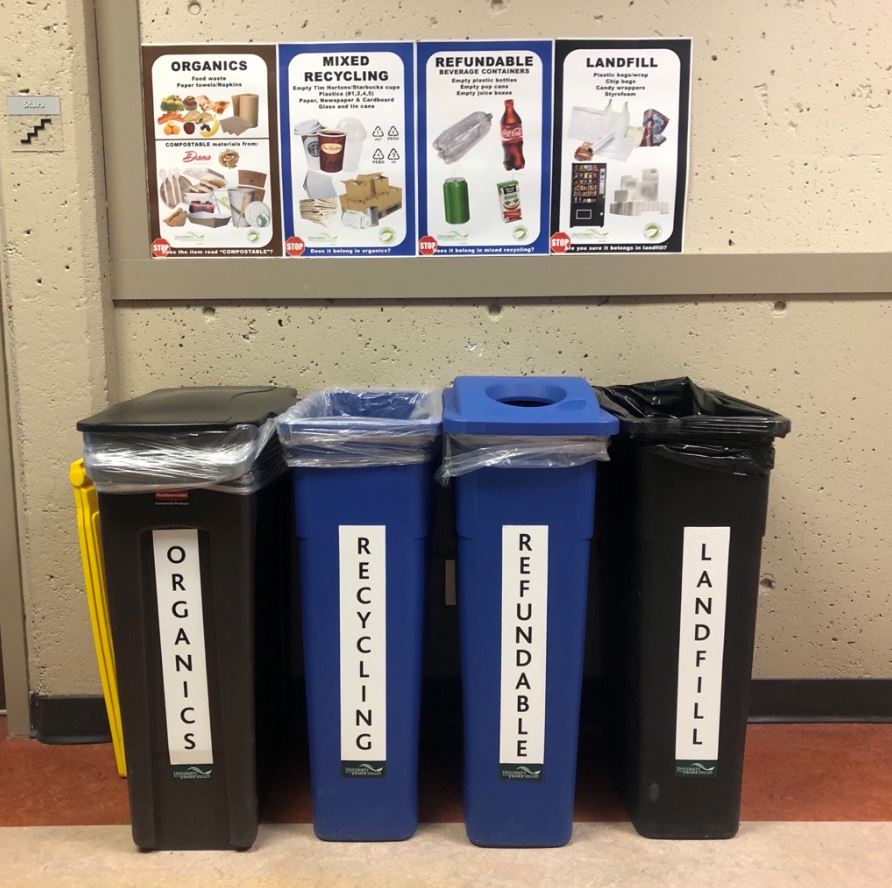Waste management is important in helping reduce our negative impacts on the environment and our health. Without proper management, waste has the potential to pollute our air, water, and soil, and increase greenhouse gas emissions.
Finding ways to reduce waste at UFV and solutions to common waste streams on campus is important in creating a more sustainable campus.
Writing utensil recycling
According to the United Nations, around 9 BILLION pens are thrown away each year. Using the writing utensil recycling boxes on campus can help prevent plastic from entering our landfills or polluting the environment.
Toss your old pens, sharpies, markers, etc. in one of our specialty boxes, and we will take them to Staples to be properly recycled and used as material for other items!

4 bin waste stations
Refundables
Refundable beverage containers are collected weekly by the Pathways group, this group collects 100% of the proceeds which funds their special needs employees.
Please ensure that coffee, tea, and other beverage cups are not placed in the Refundables bin and that no liquid remains in the container. The mess has led to many recycling centres rejecting bottles collected by Pathways, which has significant impacts on their group of exceptional individuals!
Do:
- Plastic beverage containers (pop, juice, water, etc.)
- Drink cans (pop, juice, water, etc.)
- Glass beverage containers (pop, non-alcoholic beverages, etc.)
- Carton beverage containers (juice, milk-please rinse)
- Juice boxes (juice, kool-aid, etc.)
- Empty any liquid
Don't:
- Recyclable Paper cups (Tim Horton’s, Starbucks, McDonalds)
- Compostable Paper Cups (Cafeteria, Fair Grounds, Spirit Bear Café)
Organics (Compost)
Do:
- Food products (Fruit, Vegetables, Grains, Dairy, Meat, etc.)
- Tea Bags, Coffee grounds, wooden stir sticks
- Paper towel, napkins
- Food soiled paper/cardboard
Don't:
- Recyclable coffee/tea cups (Tim Horton’s, Starbucks, McDonalds)
- Plastic utensils (Landfill)
- Plastics #1, 2, 4, 5 (Mixed Recycling)
Mixed Recycling
Do:
- Make sure recycling is clean and free from food residue
- Rigid plastics including food containers and to-go cup lids
- Metals (tin, aluminum foil)
- Paper and cardboard
- Empty coffee/tea cups (Tim Horton’s, Starbucks, McDonalds)
- Milk cartons and jugs
Don't:
- Stretchy plastics - plastic bags, sandwich bags, cling wrap etc. (Landfill)
- Chip/Candy packaging - anything from food vending machines (Bring to B-150 or Landfill)
- Food waste (Organics)
- Food soiled paper/cardboard (Organics)
- Beverage bottles (Refundables)
Landfill
Do:
- Styrofoam
- Stretchy plastics
- Plastic utensils
Don't:
- Batteries – Please bring to B150
